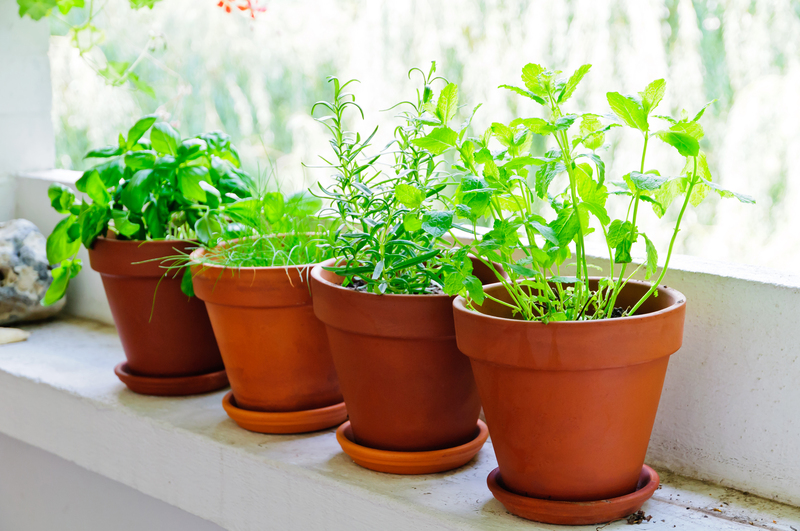Unearth the Beauty: How to Begin Your Garden Makeover
Posted on 01/06/2025
Unearth the Beauty: How to Begin Your Garden Makeover
Transforming your garden can be one of the most rewarding home improvement projects you'll ever undertake. Whether you're looking to create a peaceful retreat, entertain friends, or simply boost your home's curb appeal, a thoughtful garden makeover can work wonders. Ready to dig in? This comprehensive guide will show you how to start your garden makeover, blending inspiration with practical advice to help you unearth your garden's true beauty.
Why Begin Your Garden Makeover?
A garden transformation isn't just about aesthetics. It's an opportunity to revitalize your outdoor space, encourage biodiversity, and create an extension of your living area. More so, a beautiful garden can:
- Increase your home's value by boosting its visual appeal
- Enhance mental well-being by providing a relaxing sanctuary
- Create space for entertaining and family activities
- Encourage sustainable living and eco-friendly practices
- Support local pollinators and wildlife
Investing time and care at the beginning of your garden makeover journey will ensure your outdoor oasis flourishes for years to come.

Step 1: Analyze and Visualize Your Current Garden
Take a Critical Look
For a successful garden renovation, start by analyzing your existing space. Walk around your garden and take note of:
- Sun and shade patterns throughout the day
- Areas prone to excessive moisture or dryness
- Existing trees, shrubs, and plants worth keeping
- Problem areas such as compacted soil or invasive weeds
- Views you want to highlight or screen
Use your phone to take before photos from different angles. These will be invaluable for planning and tracking your progress.
Dream and Visualize
Now, let your imagination bloom! Consider the following:
- What styles of gardens inspire you? (Modern, cottage, Japanese, wildlife-friendly, etc.)
- Do you need areas for entertaining, kids, pets, or hobbies?
- Are low-maintenance options important for your lifestyle?
- Do you want seasonal color or year-round greenery?
Tip: Gather inspiration on Pinterest, Instagram, or gardening websites and create a mood board to clarify your vision.
Step 2: Create a Masterplan for Your Outdoor Makeover
Practical Planning
Every garden transformation needs a masterplan. This roadmap will guide all your decisions, from plant selection to hardscaping to lighting. Start by sketching your garden's layout on paper or using free online design tools.
- Mark out zones for patios, lawns, borders, beds, seating, vegetable patches, and paths
- Draw in existing features you want to keep, like trees or sheds
- Consider access points, sightlines, and practical elements like water butts or compost bins
- Add wish-list features: pergolas, fire pits, ponds, or raised beds
Budgeting is Essential--prioritize must-haves versus nice-to-haves, and plan to complete the project in stages if necessary. Break down potential expenses for:
- Hard landscaping (paving, decking, fencing, etc.)
- Soil improvement and mulches
- Plants and trees
- Outdoor lighting and furniture
- Tools and maintenance supplies
Consider Functionality and Flow
Optimize your layout for ease of movement and function. Think pathways, doorways, step heights, and even hose reach during watering. Form should always enhance function in a practical yet elegant garden makeover design.
Step 3: Prepare the Ground for Your New Garden
Clear, Clean, and Repair
Before planting your dreams, you'll need to clear the way. This step is essential for any garden rejuvenation and includes:
- Removing tired plants or invasive weeds
- Lifting and relocating bulbs or shrubs you want to reuse
- Turning over the soil and removing stones or debris
- Repairing boundaries--fix fences, gates, and sheds
- Pruning trees and shrubs for improved shape and light
Don't overlook soil health: It's the foundation of your new garden. Add compost, well-rotted manure, or soil conditioners as needed for improved fertility and structure.
Hard Landscaping Comes First
Any major construction--paths, patios, raised beds, fencing--should be completed before planting. This avoids trampling newly planted beds and lets you shape the terrain to channel rainfall or prevent waterlogging.
*Tip:* Consider permeable paving to reduce runoff and encourage groundwater replenishment.
Step 4: Select Plants for Year-Round Interest
Match Plants to Place
A stunning garden transformation depends on the right plants in the right places. Factor in:
- Soil type and pH
- Light levels (full sun, part shade, full shade)
- Exposure to wind or frost pockets
- Water availability
- Desired heights, colors, and textures
Native plants are often best for sustainability and wildlife, but don't be afraid to mix in exotics for drama. Choose a blend of:
- Evergreens for structure
- Flowering perennials for color
- Shrubs for backbone and seasonal interest
- Bulbs and annuals for splashes of brilliance
Design Layers for Depth
Layering plants from tallest at the back to shortest at the front creates depth and lushness. Think about:
- Tall trees or upright shrubs
- Medium-sized perennials and grasses
- Low-growing groundcovers and edging plants
For a dynamic garden makeover, plan for succession--something should be in bloom or offering visual interest every season.
Step 5: Add Features and Finishing Touches
Hardscape and Decor
After planting, integrate personality and function with tailored features:
- Install garden lighting for safety and drama
- Add seating--benches, hammocks, or swings
- Place containers with seasonal color near focal points
- Include water features for sound and wildlife
- Incorporate art, sculptures, or mirrors for intrigue
Outdoor living is in--consider a fire pit, outdoor kitchen, or pizza oven to extend usability through all seasons.
Mulch and Maintenance
Finish by mulching beds to suppress weeds, conserve moisture, and give a polished look. A well-laid mulch saves hours of weeding and watering, allowing you to enjoy your garden reimagining rather than working overtime!
Establish a maintenance routine: Regular watering, deadheading, mowing, and periodic feeding will keep your newly made-over garden in top shape.
Step 6: Embrace Sustainability in Your Garden Makeover
Eco-Friendly Garden Ideas
Modern garden makeovers are increasingly eco-conscious. You can contribute by:
- Planting pollinator-friendly flowers
- Managing rainwater with barrels and permeable paving
- Composting green waste
- Reducing chemical use with organic gardening methods
- Using reclaimed or recycled materials for hard landscaping
A beautiful garden is a living ecosystem--by working with nature, you'll cultivate a space that's as resilient as it is appealing.
Step 7: Enjoy the Process and Celebrate Progress
Remember, garden transformations rarely happen overnight. Embrace the journey, celebrate every improvement, and adapt as you learn from your growing landscape. Take after photos to track your achievements and inspire others.
When in doubt, seek advice from local nurseries, gardening clubs, or professional landscapers. Gardening is as much about community and creativity as it is about plants and soil.

Begin Your Garden Makeover Today!
Unearthing the beauty in your outdoor space is within reach, no matter your starting point or budget. By following these steps and staying true to your vision, you'll grow a garden that's not just visually stunning, but deeply personal and life-enriching.
- Analyze your garden's potential
- Plan with purpose
- Prepare and improve your groundwork
- Choose plants wisely for the long term
- Add memorable features and personal touches
- Garden sustainably for lasting impact
- Enjoy the journey and celebrate your new outdoor oasis
Start your garden makeover now--each season brings fresh opportunities, and every change, no matter how small, unearths a little more of your garden's unique beauty.
Frequently Asked Questions: Garden Makeover Essentials
-
How much does a garden makeover cost?
Expenses vary widely. Small DIY upgrades can be under $500, while major renovations with landscaping, planting, and features may reach several thousand dollars. Start small and build over time if needed. -
What is the first step in a garden makeover?
Assess your space, needs, and wishes. Begin by clearing and improving the soil, before moving onto structural changes and planting. -
When is the best time to overhaul a garden?
Autumn and spring are ideal times for major work and planting. Avoid hot and dry summer months for intensive projects and plant establishment. -
How do I design a low-maintenance garden?
Choose tough, drought-resistant plants, mulch generously, opt for simple shapes, and avoid intricate lawn edges or borders. -
Can a small garden still have a big impact?
Absolutely! Use vertical growing, mirrors, multi-functional features, and clever planting to make the most of any size yard or balcony.
Unleash your creativity, roll up your sleeves, and discover just how transformative a garden makeover can be--for your home, your lifestyle, and your well-being. Unearth your garden's true beauty today!
```Latest Posts
Eco-Friendly Solutions: Organic Waste to Soil
Elevate Your Landscape with Artistic Hedge Trimming
5 Practical Ways to Achieve a Budget-Friendly, Low Maintenance Garden
Find Tranquility in Your Garden with Zen-inspired Ideas
Flourish with Ease: 9 Fundamental Gardening Tips for Starters



